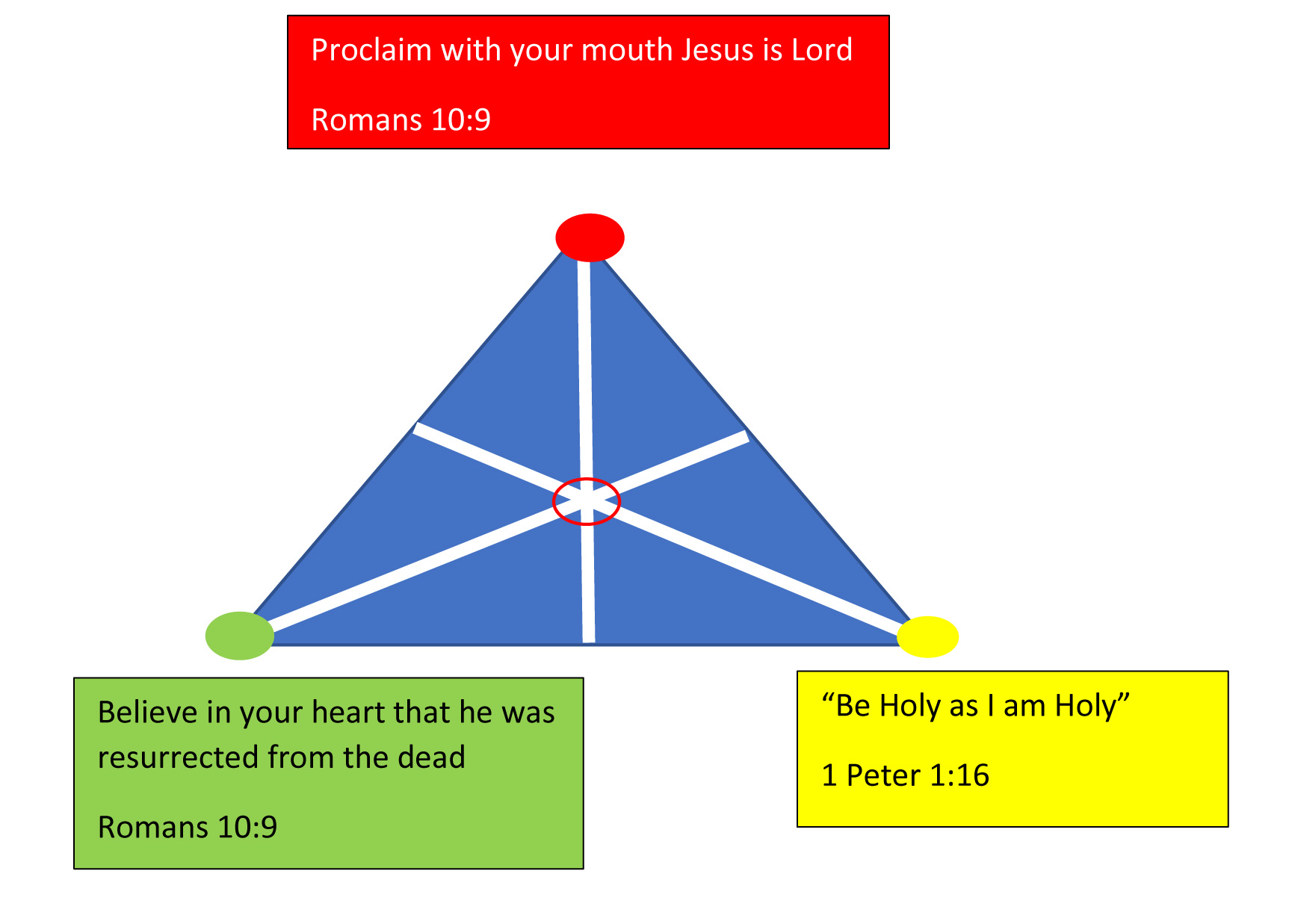
HOLY TRIANGLE?

To be honest there have been no summer blogs because there has not been the inspiration to write any. But I’m back!
And I have been pondering a very special verse in Romans that provides such assurance.
9 If you declare with your mouth, “Jesus is Lord,” and believe in your heart that God raised him from the dead, you will be saved. 10 For it is with your heart that you believe and are justified, and it is with your mouth that you profess your faith and are saved. 11 As Scripture says, “Anyone who believes in him will never be put to shame.”[e] (Romans 10:9-11)
My ponderings have moved in the direction of asking the question – what does this look like? And what does it mean for the individual believer and the witness of the church.
In my 15 years as an ordained minister one comes across a number of people who approach the church for a particular reason. It might be baptism of a child, or a wedding or thanksgiving for a long marriage or a desire to be buried in the churchyard. Very often people will support their case , often before being asked , by saying things like “I sang in the choir” or “ I was in the Boys Brigade / Guides etc”. A connection to a Church of England church can be as tenuous as “I live within the boundary of an ancient space called “parish””. And being a parishioner, means certain rights. A right to be baptised, a right to be married (the first time), and the right to be buried.
Its an interesting dynamic for an institution that represents a belief that carries with it no rights.
“23 for all have sinned and fall short of the glory of God” (Romans 3:23)
There is a line in the Holy Communion prayer where we say “we were not worthy to eat the crumbs from under your table” which is quickly followed with “But you are the same Lord whose nature is always to have mercy” – thereby we declare that we have no rights to salvation , but it is granted by God by his grace. And his grace alone. There is nothing we can do to earn it.
It is often said that God’s love is unconditional – and it is. He loves us, almost despite ourselves. As our loving creator God , he loves us whatever we do and whomever we are.
But his offer of salvation is not unconditioned.
We have a part to play.
And that’s where the holy triangle idea comes in.
Imagine a triangle, with its three corners or points.
The red corner is someone who proclaims Jesus as Lord. They have the words.
But Jesus himself said “21 “Not everyone who says to me, ‘Lord, Lord,’ will enter the kingdom of heaven, but only the one who does the will of my Father who is in heaven.” (Matthew 7:21)
Just saying the words is not enough. And Paul would agree.
The green corner is where belief comes in. Specifically a belief that Jesus was raised form the dead. So that when Jesus shared with Nicodemus the most famous words of Christian Scripture , he had a specific belief in mind.
16 For God so loved the world that he gave his one and only Son, that whoever believes in him shall not perish but have eternal life. (John 3:16)
This is not just a belief that Jesus existed, or that he was a good moral teacher or even a model human being who lived and demonstrated the love of God. For Paul, the believer, believes in the miracle. Believes that Jesus could be fully human and fully divine, Son of God at the same time. That he truly died a sinners death, although he had no sin, and was raised to actual, eternal life. And not just to believe these things intellectually but with faith, “in your heart”. That this is a sure and certain hope of the resurrection that the believer absolutely holds as true and life transforming.
But Paul says, if we are in , what I have represented as the green corner; we believe this in our hearts but do not proclaim it on our lips, then it is insufficient.
Belief and words go together.
The conjoining word is “and” – proclaim AND believe.
So why a triangle? Why three aspects?
Well, the words of Jesus give the indication. There is another aspect – our words, our beliefs and our actions. How do we know if we believe? How do we know if our words are empty?
Obedience.
Holiness means being set apart by God. It means aspiring to become Christ like which is the sanctifying work of the Spirit of God sent into the very souls of the believer after the outpouring on that first Pentecost. And holiness looks like the fruits of the Spirit:
22 But the fruit of the Spirit is love, joy, peace, forbearance, kindness, goodness, faithfulness, 23 gentleness and self-control. Against such things there is no law. 24 Those who belong to Christ Jesus have crucified the flesh with its passions and desires. (Galatians 5:22-24)
By being set apart, Christians following a way of holiness, also display God like characteristics that stand out and set them apart from the world. If the proof is in the pudding, then empty words and true belief are revealed in how lives are lived and the extent to which they are transformed!
To sit entirely in the yellow corner, is a life well lived, demonstrating things of the kingdom but without the proclamation of faith and belief in the heart, its not enough for salvation.
To sit in either of the other two – red and green – is a what James described as “faith that is dead”.
22 You see that his faith and his actions were working together, and his faith was made complete by what he did. 23 And the scripture was fulfilled that says, “Abraham believed God, and it was credited to him as righteousness,”[b] and he was called God’s friend. 24 You see that a person is considered righteous by what they do and not by faith alone. (James 2:22-24)
We can judge where we are in the green and red zones (proclamation and belief) by how that impacts our daily lives.
Obedience and repentance when we falter – because we will!
So where is the sweet spot of faith?
The diagram would suggest that it is that cross lines in the centre. Where our words, our belief and our way of life are in balance with one another.
We will travel up and down those lines as we walk through the ups and downs and succumb to pressures of life and then fall back into spiritual disciplines.
But the aim is to move towards that sweet spot as much as we can.
I have a chalk board in my kitchen. I have written on it as a reminder each morning:
“Today is a new day”.
I offer this to you as a thing to ponder too.
Every blessing
Doug
GIVING IN, GIVING UP OR GIVING OUT?